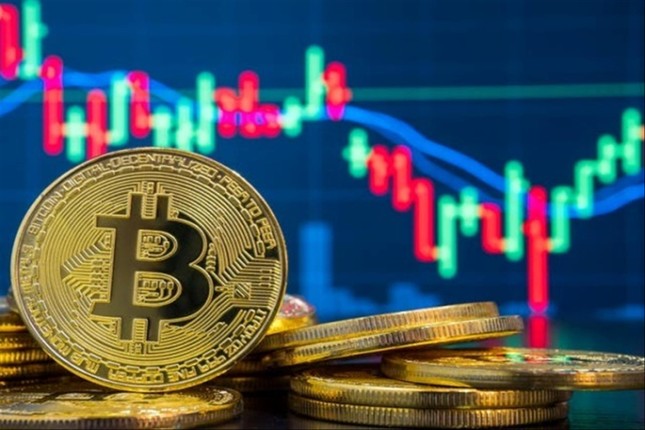Nearly 44% of Vietnamese investors lose money in cryptocurrency
Anh Minh Phuoc (Ho Chi Minh City) said he has been participating in the digital currency market since 2017. According to Mr. Phuoc, at that time, USDT (USD on the virtual currency exchange) was not popular, so when investing in any digital currency, he bought it through Bitcoin. The price of Bitcoin in 2017 was $3,000/Bitcoin, Mr. Phuoc considered it too high and switched to other digital currencies.
“As an F0 investor, I think that if the price of Bitcoin is too high, it is less likely to make a profit. I invested in many other digital currencies hoping to make a profit. Good currencies can earn interest by doubling or tripling their value within a few months, then lose their principal. Some currencies have increased by 10 to 20 times, but when the market crashed in 2018, we lost all our money,” Mr. Phuoc said.
With years of experience in cryptocurrency investment, Mr. Phuoc believes that the majority of Vietnamese investors follow trends, lack knowledge, and have limited capital. Therefore, when the market fluctuates, Mr. Phuoc incurs losses.
Sharing the same fate, Mr. Nguyen Huy (Hanoi) said he lost more than VND 400 million when investing in cryptocurrency in 2021. Mr. Huy shared that in 2021, he saw the continuous record-breaking prices of digital currencies, and his friends’ accounts quickly made a profit. He invested VND 400 million, but the price quickly dropped, causing him to incur losses.

Bitcoin reaches its peak price, but most Vietnamese investors incur losses. Illustrative photo.
“Bitcoin has a high value, so we choose currencies that were created later and have lower values with the hope that they will increase in price like Bitcoin. I mainly invest based on the experience I learned from friends, as I couldn’t find any organized programs to guide me in this market. After incurring losses, I realized that the cryptocurrency market is complex and carries high risks,” Mr. Huy regretfully stated.
Based on a survey of 1,200 participants conducted in December 2023, Coin98 Insights (a research unit on the Vietnamese digital currency market) reported that 64% of the digital currency investors in Vietnam did not make any profits. Particularly, nearly 44% of investors incurred losses in 2023.
According to Coin98 Insights, the majority of digital currency investors are concentrated in Hanoi and Ho Chi Minh City. The common income range is VND 10-25 million/month. 48.7% of respondents said they participated in the market during the 2020-2022 period when the market was experiencing strong growth.
The reasons leading to investment losses include FOMO psychology (fear of missing out on opportunities), lack of a meticulous trading plan, failure to react to unexpected market events, and incorrect use of leverage.
Many entities create virtual currency investment projects to attract investors. They entice investors to invest money to buy virtual currencies, promise interest payments, and wait for the price to skyrocket. After a certain period, the virtual currencies disappear, and investors seek help everywhere but cannot recover their money.
One of the digital currency investment platforms chosen by Vietnamese investors is Binance. As of March 6th, Binance has more than 350 coins, of which the most valuable digital currencies are Bitcoin: $66,400, Ethereum: $3,810, BNB: $409… Apart from Bitcoin, the other currencies have relatively low values. There are 11 Bitcoin investment funds established, owning more than 300,000 Bitcoins. Each country has different ways to manage virtual currencies; some countries consider virtual currencies as taxable assets and license their trading.
Struggling to manage virtual currencies
The Ministry of Finance stated that it has assigned the State Securities Commission (SSC), in coordination with relevant ministries and agencies, to research and construct regulations for managing virtual currencies and virtual assets. Up to now, the SSC has collected opinions from various ministries and agencies. However, the feedback has not clarified the research methods or the approach to building a legal framework for virtual currencies.
“Building a legal framework for virtual assets and virtual currencies is challenging and involves many risks. Although some countries have recognized virtual assets and digital currencies and allowed exchanges, Vietnam’s laws do not currently recognize virtual currencies as assets. To carry out transactions, virtual currencies must be recognized as assets and established exchanges and transaction regulations,” the Ministry of Finance said.
In Decision No. 194 issued on February 23, 2024, the Government assigned the Ministry of Finance to research and construct a legal framework to prohibit or regulate virtual assets in May 2025.
In a conversation with a reporter from Tien Phong, Prof. Phan Phuong Nam (HCMC University of Law) said that although it is difficult, managing virtual currencies is essential. Vietnam has not recognized virtual currencies, but people still invest and trade them, which poses many risks.
“The competent authorities should learn from international experiences, recognize digital currencies as assets. Because of their unique nature, recognizing assets is similar to considering the beauty of a body that must have complete parts such as arms and legs. If virtual currencies are not recognized as assets, they will fall into a ‘legal void’,” Prof. Nam said.
Prof. Nam compares recognizing digital currencies as assets to building a complete body with all the necessary parts before considering external beauty. If virtual currencies are not recognized as assets, there will be a “legal gray area”.
“Recognizing virtual currencies as assets has no precedent, but the competent authorities should not be overly cautious. We can learn and adjust as we go until we have a complete legal framework. Recognizing virtual currencies as assets like any other assets is normal, and regulations can require investors to prove the source of funds for investing in virtual currencies. At the same time, the competent authorities should disseminate information to prevent people from misunderstanding virtual currencies as a means of payment and to avoid risks and distortions,” Prof. Nam suggested.















